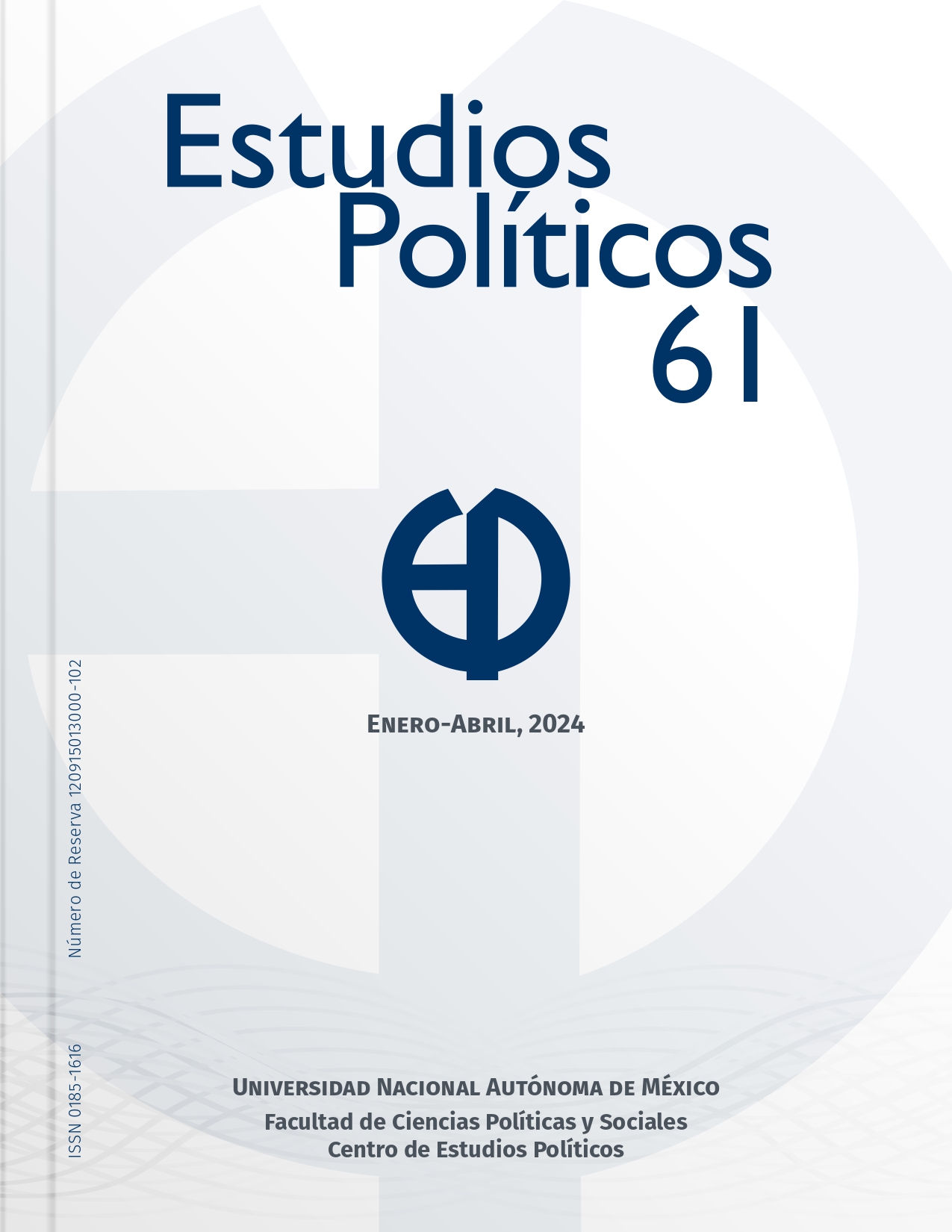Bob Jessop y el thatcherismo. Potencialidades y déficits en el uso del enfoque estratégico relacional
Contenido principal del artículo
Resumen
A principios de los años ochenta, el teórico británico Bob Jessop emprendió una revisión crítica de la teoría marxista del Estado, dándole continuidad a los aportes de Nicos Poulantzas. Su enfoque estratégico relacional se sirve de los aportes de la teoría de la regulación y de los sistemas para reforzar la capacidad autónoma del Estado. Pero estos aportes se han visto confrontados con fortuna desigual en el laboratorio de la política británica, en particular su análisis sobre el thatcherismo. Los aportes en torno a la Economía Político Cultural de los años 2000, que enfatizan la coevolución e interdependencia de lo semiótico y lo extrasemiótico son un intento de repensar esas debilidades intentando superar los enfoques más economicistas
Descargas
Detalles del artículo
Citas en Dimensions Service
Citas
Anderson, Perry (1988). Tras las huellas del materialismo histórico (2a edición), México. Siglo XXI.
Block, Fred (2010). The Future of Economics, New Circuits for Capital, and Re-Envisioning the Relation of State and Market. Lounsbury, Michael and Hirsch, Paul (2010). Markets on Trial: The Economic Sociology of the U.S. Financial Crisis, Research in the Sociology of Organizations, vol. 30 Part B. Emerald Group Publishing Limited, 379-388.
Faye, Jean-Pierre (1973). Los lenguajes totalitarios. Madrid. Taurus.
Faye, Jean-Pierre (1974). Classes sociales, articulation, pouvoir. Réplique a Poulantzas. La critique du langage y son economie. Auver s-sur·Üise. Editions Galilée.
Gallas, Alexander (2015). The Thatcherite Offensive. A Neo-Poulantzasian Analysis. Historical Materialism Book Series, vol. 107. Leiden-Boston. Brill Academic Publishers
Hall, Stuart (1988). Authoritarian Populism. Jessop, Robert and Bonnett, Kevin and Bromley, Simon and Ling, Tom (eds). Thatcherism: A Tale of Two Nations. Cambridge. Polity.
Hall, Stuart, (1979). The Great Moving Right Show. Marxism Today. January 1979. 14-20.
Hay, Colin (1994). Werner in Wunderland or notes on a marxism beyond pessimism and false optimism. Multitudes. Numéro spéciaux : Futur Antérieur. Septembre 1994. École de la régulation et critique de la raison économique. Une polémique anglo-saxonne, Multitudes, revue politique artistique philosophique. https://www.multitudes.net/Werner-in-Wunderland-or-notes-on-a/
Hay, Colin (1996). Narrating Crisis: The Discursive Construction of the ‘Winter of Discontent. Sociology, 30(2), 253–77.
Hay, Colin (2006). (What´s Marxist about?). Marxist State Theory. Colin Hay, Michael Lister y David Marsh (eds) (2006). The State: Theories and Issues. London. Palgrave Macmillan.
Hay, Colin (2007). Whatever Happened to Thatcherism? Political Studies Review. vol. 5, 183–201.
Jessop, Robert (1977). Teorías recientes sobre el Estado capitalista. Archila, M., (comp.). (1980). La crítica marxista del estado capitalista: del estado-instrumento a la forma-estado. Bogotá. CINEP.
Jessop, Robert (1980). The Transformation of the State in Postwar Britain. Scase, R. (ed.) (1980). The State in Western Europe. London. Croom Helm. 23–94.
Jessop, Robert (1982). The capitalist State. Marxist theory and methods. London. Macmillan.
Jessop, Robert (1990a). State Theory: Putting Capitalist States in their Place. Cambridge Polity Press.
Jessop, Robert (1990b). Regulation Theories in Retrospect and Prospect. Economy and Society. 19 (2). May. DOI: 10.1080/03085149000000006.
Jessop, Robert (1992). Fordism and post- Fordism: A critical reformulation. Scott, Allen J. and Storper, Michael (eds.). (1992). Pathways to Industrialization and Regional Development, London, Routledge.
Jessop, Robert (1999). The Strategic Selectivity of the State: Reflections on a Theme of Poulantzas. Journal of the Hellenic Diaspora. 25 (12), 137.
Jessop, Robert (2001). Bringing the state back in (yet again): reviews, revisions, rejections, and redirections. International Review of Sociology. 11 (2). 149-173.
Jessop, Robert (2002). Revisiting Thatcherism and its Political Economy: Hegemonic Projects, Accumulation Strategies, and the Question of Internationalization. Abigail Bakkan and Eleanor MacDonald (eds.) Critical Political Studies: Debates and Dialogues from the Left. Montreal. McGill University Press.
Jessop, Robert (2004). Critical Semiotic Analysis and Cultural Political Economy. Critical Discourse Studies. 1 (2). 159-174.
Jessop, Robert (2007). State power: A strategic-relational approach. London. Polity.
Jessop, Robert (2008). El futuro del Estado capitalista. Madrid. Catarata.
Jessop, Robert (2015). The State. Past, Present, Future. Cambridge, Polity Press.
Jessop, Robert (2016). The Organic Crisis of the British State: Putting Brexit in its Place. Globalizations. 1-9. Routledge. DOI: 10.1080/14747731.2016.1228783.
Jessop, Robert (2018). Neoliberalization, uneven development, and Brexit: further reflections on the organic crisis of the British state and society. European Planning Studies. 1–19. DOI:10.1080/09654313.2018.1501469.
Jessop, Robert (2021) [2001]. Trayendo al Estado de vuelta (otra vez): comentarios, revisiones, rechazos y redirecciones. Sanmartino, J. (2021). La teoría del Estado después de Poulantzas. Buenos Aires. Editorial Prometeo.
Jessop, Robert and Bonnett, Kevin and Bromley, Simon and Ling, Tom (eds) (1988). Thatcherism: A Tale of Two Nations. Cambridge. Polity Press.
Jessop, Robert y Sum, Ngai-Ling (2006). Towards a cultural international political economy: poststructuralism and the Italian School. Marieke de Goede (ed.), International Political Economy and Post-Structural Politics, Basingstoke. Palgrave. 157-176.
Jessop, Robert y Sum, Ngai-Ling (2013). Towards a Cultural Political Economy. Putting Culture in its Place in Political Economy. Edward Elgar Cheltenham. UK and Northampton. MA. USA.
Jessop, Robert y Sum, Ngai-Ling (2020). Brexit as a double movement? International Karl Polanyi Society. International Karl Polanyi Society. http://www.karlpolanyisociety.com/2020/04/30/brexit-as-a-double-movement/.
Kerr, Peter (2001). Postwar British Politics: From Consensus to Conflict. London. Routledge.
Leys, Colin (1990). Still a question of hegemony. New Left Review I/181, may-june 1990. Disponible en:
https://newleftreview.org/issues/i181
Lister, M. y Marsh, D (2006). Conclusion. Colin Hay, Michael Lister y David Marsh (eds) (2006). The State: Theories and Issues. London. Palgrave Macmillan.
Nettl, John Peter (1969). The State as a Conceptual Variable. World Politics. vol. 20. 4 (Jul.), 559-592.
Mann, Michael (1997). Las fuentes del poder social. vol II. Madrid. Alianza Editorial.
Offe, Claus (1974). Structural Problems of the Capitalist State. Class Rule and the Political System. On the Selectiveness of Political Institutions. German Political Studies, K. von Beyme (Ed.), vol. 1, London, Sage, 31-54.
Poulantzas, Nicos (1973). “Note a propos du totalitatisme”, Revista Tel Quel, num 53.
Poulantzas, Nicos (2005) [1978]. Estado, poder y socialismo (7ma edición), México, Siglo XXI.

Esta obra está bajo una licencia internacional Creative Commons Atribución-NoComercial-SinDerivadas 4.0.

Este obra está bajo una licencia de Creative Commons Reconocimiento-NoComercial-SinObraDerivada 4.0 Internacional.

